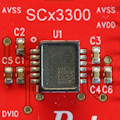A micro-display based on Neopixel leds
 This week, we are going to talk about the Yocto-Color-V2. This module can drive up to 150 RGB leds. In a previous post, we saw how to create animations which are run directly by the Yocto-Color-V2. There are however limitations and for complex animations we sometimes have to compute each frame of the animation and to update the leds from the application. This is what we are going to do this week.
This week, we are going to talk about the Yocto-Color-V2. This module can drive up to 150 RGB leds. In a previous post, we saw how to create animations which are run directly by the Yocto-Color-V2. There are however limitations and for complex animations we sometimes have to compute each frame of the animation and to update the leds from the application. This is what we are going to do this week.
| No comment yet | Read more... |
Yocto-Visualization: User's guide
![]() The Yocto-Visualization application which enables you to easily visualize the data coming from Yoctopuce sensors wasn't implemented in a day. It's main development spread over more than two years. This is why the information about it is somewhat scattered around this blog. This week, we decided to gather all the pieces of information into a post. If you have never used Yocto-Visualization before, you can find here everything you need to know. If you have already used it, take the time to browse through this post, you may have missed some interesting details.
The Yocto-Visualization application which enables you to easily visualize the data coming from Yoctopuce sensors wasn't implemented in a day. It's main development spread over more than two years. This is why the information about it is somewhat scattered around this blog. This week, we decided to gather all the pieces of information into a post. If you have never used Yocto-Visualization before, you can find here everything you need to know. If you have already used it, take the time to browse through this post, you may have missed some interesting details.
| 9 comments | Read more... |
Inclinometer tests
 For some applications, the Yocto-3D and the Yocto-3D-V2 can be used as inclinometers, as they can estimate their spatial orientation. But you may have noticed that we don't provide any accuracy information on the inclination measure in the specifications. To know more, we are going to compare these two modules today with the Murata SCL3300 precision inclinometer that we interfaced last week with a Yocto-SPI.
For some applications, the Yocto-3D and the Yocto-3D-V2 can be used as inclinometers, as they can estimate their spatial orientation. But you may have noticed that we don't provide any accuracy information on the inclination measure in the specifications. To know more, we are going to compare these two modules today with the Murata SCL3300 precision inclinometer that we interfaced last week with a Yocto-SPI.
| No comment yet | Read more... |
Querying an SPI sensor automatically
 After last week's post on how to query an SPI sensor by explicitly managing SPI communications using the Yoctopuce library, we are now going to show how the Yocto-SPI can make your life even easier, and above all simplify the code of the application.
After last week's post on how to query an SPI sensor by explicitly managing SPI communications using the Yoctopuce library, we are now going to show how the Yocto-SPI can make your life even easier, and above all simplify the code of the application.
| No comment yet | Read more... |
Querying an SPI sensor in C#
 Creating a software to query an SPI sensor contains a number of traps, linked to the specificities of this communication mode. This post provides some advice to avoid the most frequent pitfalls.
Creating a software to query an SPI sensor contains a number of traps, linked to the specificities of this communication mode. This post provides some advice to avoid the most frequent pitfalls.
| No comment yet | Read more... |
1 ... 10 ... 20 ... 30 ... 40 ... 50 ... 58 59 60 61 62 63 64 65 66 67 68 ... 70 ... 80 ... 90 ... 100 ... 110 ... 120 ... 130 ... 140 ... 150 ... 152


